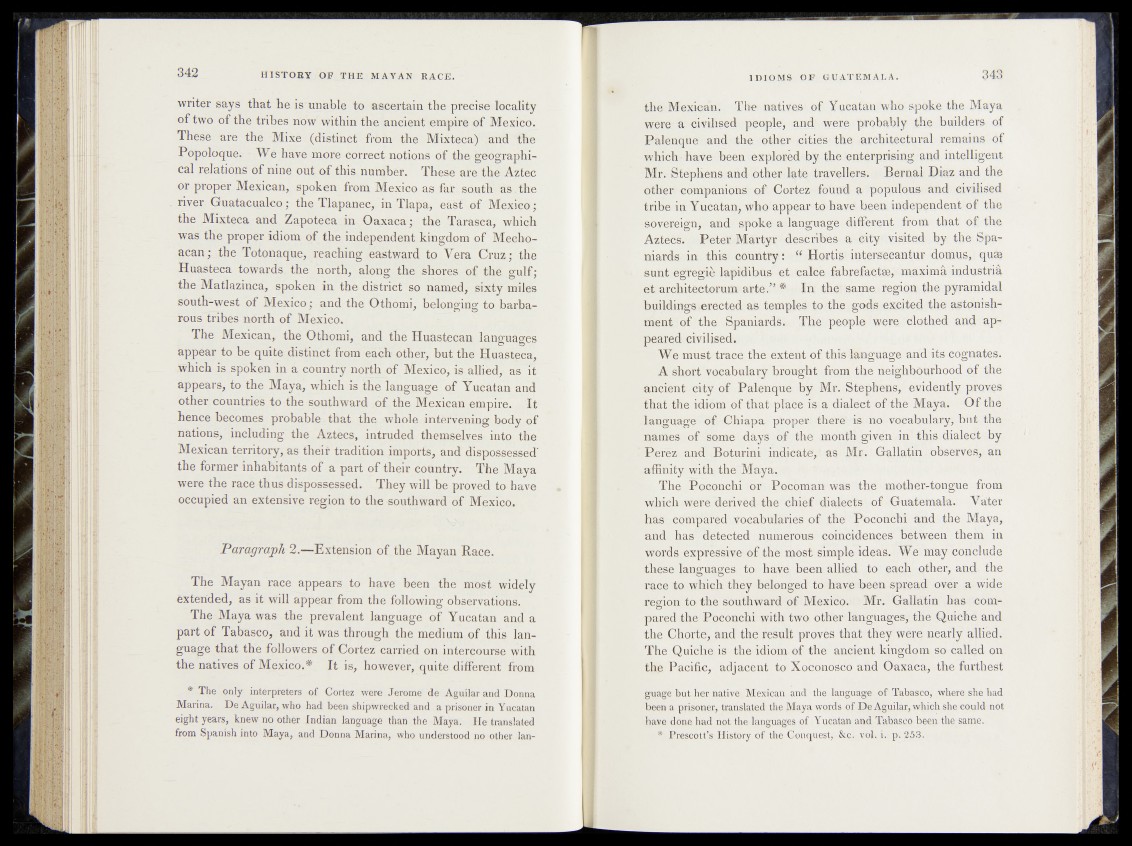
writer says that he is unable to ascertain the precise locality
of two of the tribes now within the ancient empire of Mexico»
These are the Mixe (distinct from the Mixteea) and the
PopOloque. Wè have more correct notions of the geographical
relations of nine out of this number. These are-the Aztec
or proper Mexican, spoken from Mexico as far south a s , the
river Guatacualco; the Tlapanec, in Tlapa, east of Mexico ;
the Mixteea and Zapoteca in Oaxaca; the Tarasca, which
was the proper idiom of the independent kingdom of Meeho-
acan; the Totonaque, reaching eastward to Vera Cruz; the
Huasteca towards the north, along the shores of thé gulf:
the Matlazinca, spoken in the district so named, sixty miles
south-west of Mexico; and the Othomi, belonging to barba-
rous'tribes north of Mexico.
The Mexican, the Othomi, and the Huastecan languages
appear to be quite distinct from each pjther, but the Huasteca,
which is spoken in a country north of Mexico*} is*, allied^ as it
appears, to the Maya, which is the language of Yucatan, and
other countries to the southward of the Mexican empire. It
hence becomes probable that the whole intervening body of
nations, including the Aztecs, intruded themselves* into the
Mexican territory, as their tradition imports, and dispossessed'
the former inhabitants of a part of their country. The Maya
were the race thus dispossessed. They will be proved to have
occupied an extensive region to the southward of Mexico..
Paragraph 2.—Extension of the Mayan Race.
The Mayan race appears to have been the most widely
extended, as it will appear from the following observations.
The Maya was the prevalent language of Yucatan and a
part of Tabasco, and it was through the medium of this language
that the followers of Cortez carried on intercourse with
the natives of Mexico.* It is, however, quite different from
* The only interpreters of Cortez were Jerome de Aguilar and Donna
Marina. De Aguilar, who had been shipwrecked and a prisoner in Yucatan
eight years, .knew no other Indian language than the Maya. He translated
from Spanish into Maya, and Donna Marina, who understood no other Janthe
Mexican. The natives of Yucatan who spoke the Maya
were a civilised people, and wereprobably the builders of
Palenque and the. other -cities the architectural remains of
which* have been explored« by the enterprising and intelligent
Mr. Stephens, and other late travellers. Bernal Diaz and the
other companions of Cortez -ftfind a populous and civilised
tribe in Yucatan, who appear to have* been independent of the
isovereign^' and spokersa&language ^different from that of the
Aztecs. 3 Peter Martyr describes a city* visited by the Spaniard#
in this country: “ Morti# interne,eantur domus, qua*
sunt egregid lapidibus -et calce fabrefact^e/lmaximh industria
^ arcWittctofum art#.’* ■ In the’ same region the pyramidal
buildings>erected as templet to the gods- excited the astonish-1
ment of the Spaniards. The people were clothed and appeared
civilised.
We miist/traee the extent of this language and its cognates.
A short vocabulary brought from the-neighbourhood of the'
ancient .city of Palenque by Mr. Stephens,! evidently pTQves
that the idiom of that plate is:a dialect ofhhe Maya. Of the
Chiapa proper theri^is no vocabulary, but the
nhmesJiof some days of the .month gts%i in this dialect by
Perez and Boturini indicate,' as Mr. Gallatin observe^, an
•affinity with the Maya,
The Poconchi or Poeoman was the mother-tongue from
which were derived the chief dialects of Guatemala. Vater
has compared vocabularies of thecPoconchi and the Maya,
and has detected numerous coincidences" between'them hi
words expressive of the most simple ideas. We may conclude
these languages to have been allied to each other, and the
race to which they belonged to havmbeen spread over, ;a wide
region to the southward Of Mexico.* Mr. Gallatin has com-
pared the Poconchi with two other langlaa'gersy the Quiche and
the Chorte, and the result proves that they were nearly allied.
The Quiche, is the idiom« of the ancient hipgjdoqa So-Called on
the Pacific, adjacent to XoconoMl and Oaxaca, the furthest
guage but her native; Mexican t.and the language of* Tabasco, where she had
been a prisoner^ translated tfie |§aye-vrords of.^e Agpilsr, whiih^h® not
have done had npt the* languages of .Yucatan and Tabasco been the same.
* Prescott’s History of the Conquest, &c. vol. i.* p. 253.